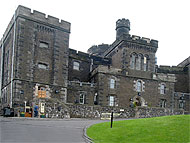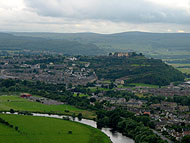Stirling




Today before lunch we and the whole White family had to "go to jail". Stirling has
an old famous prison. It was the first jail in
Scotland improved in awareness of new humane ideas in the Victorian
ages. The jail substituted the medieval dungeons and should
"improve" the prisoners. There are guided tours through
the jail and about the history of the penal system in Scotland. These tours
are really worth to "undergo". At first we got a rough welcome
by the "Chief Officer of the Jail" and after he learned us the
rules and a right discipline he guided us with rigidity but not without
humor through the floors and cells up to the roof of the building. From
there we had a nice view down to the old city of Stirling and to the
Castle. After this we said good bye to the young members of the
families. They wanted to go downtown by themselves. After visiting John Cowanes Hospital
and the coronation church Holy Rude we went to the
Wallace Monument.
On this place it is necessary to say that Stirling with its strong
castle is the naturally gate to the Highlands. Whoever wanted to occupy
Scotland at first he had to capture Stirling. Two times the Scots
defeated English troops near Stirling. Both times the Scots were less combatants,
both times they triumphed in result of the better tactic of their leaders and
the greater ambitions of the Scottish fighters. So it is no wonder that up to today
Stirling is a symbol of national pride for the
Scots.




The Wallace Monument is located on a rock. The tower consists of some floors and a viewing platform
on the top. It was very interesting for me that the exhibition inside the
monument handles not only the historical fights and victories around
Stirling. The topic of the exhibition was all that stuff the Scots are
proud of. And there at first the great Scottish scientists, poets,
globetrotters and inventors are presented as the real heroes of Scotland. Who does know outside Scotland that the asphalt
of our roads, the
air filled tire and the penicillin are invented by Scots? And who
does know outside Scotland that the great globetrotter Livingston was
not an Englishmen as well as the poets Robert Luis Stevenson and Sir
Arthur Conan Doyle? All of them were Scots!
And the best of this trip through Scottish history was my guide, a
Scotsman believing in and proudly of his nation but without any
stupid nationalism.
I think the Scots are able to educate some Germans a lot in this matter.
Late afternoon we played Bowling - Scottish Bowling. This game
is very different to the Bowling known in Germany. Scottish Bowling is
played at the Green. This is a lawn cut as short as I never saw before.
Touching the Green it does not feel like naturally grass. Of course its
only allowed to go onto the Green in special shoes. The rules are
comparable with the French Boulé (German or Italian "Boccia").
But the balls have a center of gravity out of the center of the sphere
and so the trace of the bowl goes as more spherical as the speed
decreases at the end of the shot. The game was not easy to play but we
had a lot of fun. Also the view inside the club was very interesting.
The age of the Club is unbelievable for German ones: The Club was founded
before 1900 and its members are continually playing at this green for
nearly 100 years. There are long waiting lists for membership and
strictly rules to take care of the Green. Although it is not allowed to
play for local friends and family members we were allowed to
play - many thanks to the Club and all its friendly members we met on
this day.